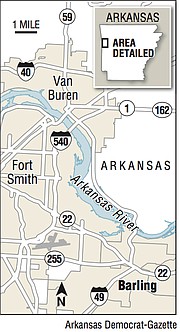FORT SMITH -- Fort Smith claims next-door neighbor Barling owes more than $1 million for water it agreed to buy even though the water was never used.
Fort Smith's board passed a resolution Tuesday to continue negotiating with Barling officials over the water debt but to initiate legal action if an agreement with Barling could not be reached.
"I don't believe this needs to be worked out in the courtroom," Bill Young, a Barling city director, told the Fort Smith board during a meeting Tuesday night.
Young and Fort Smith city directors said they believed a solution could be worked out by the March 1 deadline set out in the resolution.
Kevin Settle, the Fort Smith city director who introduced the resolution, said all users of Fort Smith water must pay their fair share.
He reminded the board that Fort Smith is going to pay $180 million over the next 10 years to upgrade transmission lines and the treatment plant to deliver quality water to users in the region.
Fort Smith supplies water to more than 100,000 users in western Arkansas and eastern Oklahoma.
"Everybody should pay their fair share," Settle said.
He also said he remembered the public backlash against him and other board members in 2012 when the city lost more than $250,000 that it failed to charge Van Buren for its Fort Smith water.
"I'm not going to live through that again," Settle said.
Barling received word last year that it owed the city $1.146 million as part of a 2002 agreement that adjusted the municipal boundaries of the two cities at Chaffee Crossing.
City Administrator Carl Geffken of Fort Smith said Tuesday that in August 2017 he found during a review of the 2002 agreement a section that obligated Barling to buy a minimum amount of water each day, 587,200 gallons, even if Barling didn't use it all.
City Administrator Mike Tanner of Barling said in the four years he's been in office, Fort Smith has billed Barling only for water used.
"Fort Smith has never billed Barling for minimum over actual month-to-month [water use]," he said. "It's billed actual usage."
Tanner said Barling still has not received a bill for the $1.146 million that Fort Smith claims Barling owes. The city had enough money to pay the charge but it would "put a dent in the water fund," he said.
Tanner said Fort Smith's minimum water-usage charge is for the past five years. It couldn't go back any further because of the statute of limitations.
It was unclear how much negotiating had taken place since Geffken discovered the minimum daily-usage requirement last year. Geffken said there was a "long gap" in discussions between 2017 and 2018.
He told the city board Tuesday that he, City Attorney Jerry Canfield and Utilities Director Jerry Walters drew up a proposed contract to resolve the debt that was presented to Barling officials in August.
Geffken said the proposed contract would charge Barling $2.40 per 100 cubic feet of water instead of the current charge of $1.80. The additional charge, Geffken said, would gradually recoup the $1.146 million.
Young told the Fort Smith board Tuesday that he believed it was impossible for Barling to meet the minimum amount of water requirement in the 2002 agreement. He said that in settling the boundaries between Fort Smith and Barling at Chaffee Crossing, Barling lost many water customers who went to Fort Smith.
Chaffee Crossing is about 7,000 acres of former Fort Chaffee military land that was turned back to civilian use. The land was divided among Fort Smith, Barling and Sebastian County.
State Desk on 11/22/2018
